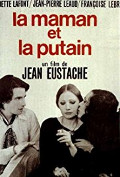
France 1973
Directed by
Jean Eustache
215 minutes
Rated M
Reviewed by
Bernard Hemingway

The Mother And The Whore
The Mother and the Whore, Jean Eustache’s feature film debut is a serio-comic portrait of la vie bohème Left Bank post-May ’68 style. Widely regarded as a classic of the Nouvelle Vague period of French film itt won the Grand Jury and International Critics Prizes at the 1973 Cannes Film Festival. Take it out of that context however and it is a hugely overlong affair that wilfully co-opts Paris as the mythical city of romance, philosophy, literature and the arts in general (the penultimate scene plays out to ‘Les Amants de Paris’ sung in its entirety by Édith Piaf).Playing much the same role as he had for François Truffaut, Jean-Pierre Léaud is a feckless, unrealistic self-centred skirt-chasing man-child, Alexandre. He is in a rocky relationship with Marie (Bernadette Lafont) with whom he lives while trying to win back his ex-girlfriend, Gilberte (Isabelle Weingarten). One day he picks up a girl, Veronica (Françoise Lebrun), an emotionally disconnected young woman. The bulk of the film is an account of his ménage à trois arrangement with her and Marie (apparently based on Eustache’s own experiences).
A succès de scandale in its day ('Le Figaro' called it “an insult to the nation”) the film, set in Paris in 1972 is, for its time, a remarkably frank account of the permissive sexual relations that mainstream French society had not yet acknowledged set against a background of post-’68 counter-culture detumescence and an economy in recession. In this respect it is a valuable time capsule particularly with its location shooting (well delivered by Pierre Lhomme‘s black-and-white cinematography) around the Saint-Germain-des-Près area of the 6th arrondissement, a favourite haunt of the Existentialists and the American literary diaspora (Les Deux Magots. La Coupole, and the Café Flore all get mentions). The wordy script which is written by Eustache, at times it feels as if under the influence of Oscar Wilde, is a seemingly interminable mish-mash of paradoxical utterances, literary flights of fancy and poeticizing self-flagellation (notably Veronica’s monologue on f**king towards the film’s end) and yet it seems surprisingly spontaneous (although apparently Eustache had the actors read from cue cards).
Léaud is Léaud, which needless to say is largely appealing yet borderline annoying whilst Françoise Lebrun who looks like a character from silent cinema is a strangely compelling presence and Bernadette Lafont serves her purpose as a solid anchor to the over-wrought antics of the other two.
FYI: Eustache only directed one more feature film, Mes Petites Amoureuses (1974), before committing suicide in 1981 at the age of 42.
Want something different?





